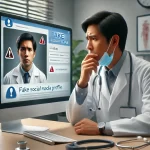Lisa, a nurse’s assistant manager suddenly approached her supervisor and calmly handed her resignation paper. The surprised supervisor led Lisa to their office and immediately asked her, “Why?Something wrong? What happened?” Lisa, close to tears, answered in a terse voice, “I’m tired. As in really tired. You know I love this work and I knew this is my calling, but I can’t seem to finish any significant work on my program and my own people is close to collapsing in disagreement and project stasis. Moreover, I’m having family issues with my frequent over times and missed events. I think, I’m going to take that “remote work” offered to me months ago by a healthcare network.” she continued, as tears swelled in her eyes. Lisa was promoted to her current post barely a year ago. She has a lot of potential and was an achiever in her previous post as a unit head. So this came as a shock to her peers.
We’ve seen so many Lisa’s in healthcare nowadays. In fact, I’ve been through the same in almost every ladder of my career I felt It was just me resistant or unable to adapt at the rapidly changing and complex healthcare system. Burnout is so common among healthcare workers nowadays that we simply label it as an individual’s inability to cope with the complex and fast changing healthcare, as if it is the healthcare workers fault alone. But, is it? Is it really the individual healthcare worker’s fault?
Lisa’s case though is more than just a burnout. It was an accumulation of a problem that wasn’t diagnosed and unaddressed early on. It was a systemic challenge and there were telltale signs already before the resignation- project stasis, team collapsing, family concerns etc. Lisa thought that it was she who is the problem and thus felt she needed to leave work.
While the signs of burnout is quite classic among individual healthcare workers, its telltale sign at the group, institution or organizational level is much much more difficult to identify and mitigate. At such level, the ramification of a burnout are catastrophic. Medical errors could undermine quality patient care resulting to morbidities and mortalities. Thus it is very important to identify and help mitigate burnout at an individual and organizational level. This is the topic of #Healthxph chat this saturday February 10, 2024 9M Manila time.
The Burnout in Healthcare Teams.
Thomas Huber in his book “Healthcare Transformation: From Burnout to Balance” identified initiative overload as an avalanche of expectations, demands and innovations that healthcare workers, managers, doctors and nurses face in their daily practice”. Huber also defined group attention deficit (group ADD) as the ” collective inability within a team to maintain focus on core tasks and goals amid constant change and complexity.” Huber posits initiative overload may cause and is interrelated to group ADD, I would also think that initiative overload could cause individual and team burnout.
T1. What cause initiative overload and group attention deficit in healthcare teams?
There are interrelated internal and external factors causing initiative overload and group attention deficit in teams. Many of the healthcare teams I’ve been involved in the past suffered partly or in a mix of internal factors such as leadership styles, team culture (resistant to change) and interpersonal relationships. Externally, regulatory changes such the UHC implementation (the intentions of which are truly noble) exerts pressure with redirected health financing and technological implementation (EHR, ugh!) that healthcare organizations frequently change mandate to survive. As healthcare become more patient centric and expectations soared amid technological explosion, revising and implementing new processes added more burden to a struggling healthcare organization.
T2. What are the signs of initiative overload and group attention deficit in healthcare teams?
Early signs include team losing focus and unmet objectives or goals. The team progress is static or its programs stalls. Late signs include the team organization and systems disintegrating or collapsing. Signs and symptoms may not be limited to just the healthcare team. The quality of care may also be impacted as medical errors or substandard care may put patients lives in danger.
T3. How do team leaders mitigate initiative overload and group attention deficit?
Team leaders should be able identify signs of initiative overload and group ADD. You can’t mitigate something you don’t know. Providing psychological safe space for health workers to thrive is easier said than done. At team or organization level, this is more reflected at providing safe, supportive and transparent working environment. I am currently working on developing my group communication skills like clearly conveying goals and feedbacking to support the many transitions teams experience in healthcare. With the so many healthcare initiatives now, I still struggle at prioritizing goals, as many of these initiatives are deemed necessary by the regulatory agencies and the public in general.
T4. What are the roles and contribution of team members in mitigating initiative overload and group attention deficit?
Everything that works against burnout should mitigate initiative overload and group ADD. I found effective personal communication a challenge, but is doubling my effort to develop in this area via continuous learning. Continuous learning also help me adapt to the ever changing demands of healthcare. Self awareness isn’t easy and ironically it takes someone else other than yourself to be “self aware”. I also have an “off and o” relationship with effective prioritization and task management as reflected on the many books on such topic at my shelves. My bottomline here is that whatever I learn as an individual, as healthcare professional, imperfect as the case maybe, I share and teach these to our teams, to mitigate initiative overload, avoid group attention deficit and help transform healthcare without running my team to burn out.
Image by jcomp on Freepik







